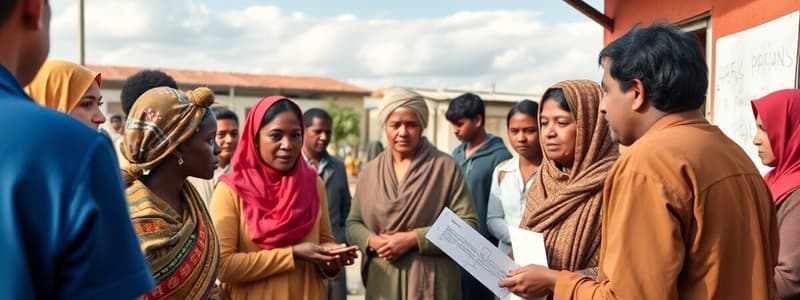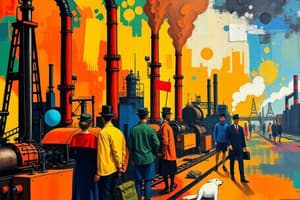Podcast
Questions and Answers
What is a key component of the systems leadership and changemaking lab?
What is a key component of the systems leadership and changemaking lab?
- Creating a portfolio of individual accomplishments
- Developing a systems map based on the lab (correct)
- Engaging in public speaking exercises
- Participating in non-repetitive group discussions
What percentage of the overall mark comes from class participation?
What percentage of the overall mark comes from class participation?
- 5%
- 20%
- 10%
- 15% (correct)
Which of the following best describes the engagement strategy outlined for class discussions?
Which of the following best describes the engagement strategy outlined for class discussions?
- Formal debates are mandatory to pass
- Disagreeing with individuals is not allowed
- Everyone should agree to maintain harmony
- Bringing evidence supports the points made (correct)
What does the term 'discomfort zone' refer to in the context of personal growth?
What does the term 'discomfort zone' refer to in the context of personal growth?
What is expected in terms of language use during discussions?
What is expected in terms of language use during discussions?
What is a primary goal regarding mini-deliverables in the course?
What is a primary goal regarding mini-deliverables in the course?
How should students approach tough questions about the material or themselves?
How should students approach tough questions about the material or themselves?
What is emphasized regarding the submission of results from class activities?
What is emphasized regarding the submission of results from class activities?
What is a main objective of the Community Service Learning (CSL) component in this class?
What is a main objective of the Community Service Learning (CSL) component in this class?
What is the total percentage weight of the reflections in the overall assessment?
What is the total percentage weight of the reflections in the overall assessment?
What type of skills are students expected to demonstrate through their reflections?
What type of skills are students expected to demonstrate through their reflections?
Which of the following is NOT a requirement for the reflections?
Which of the following is NOT a requirement for the reflections?
How are late submissions penalized for reflections?
How are late submissions penalized for reflections?
What is the maximum word count for the reflections excluding the title page and bibliography?
What is the maximum word count for the reflections excluding the title page and bibliography?
What can students expect to find in D2L concerning the course requirements?
What can students expect to find in D2L concerning the course requirements?
Which of the following best describes the instructor's role in the course?
Which of the following best describes the instructor's role in the course?
Flashcards
Agents of Social Change
Agents of Social Change
A university course focused on understanding and applying social innovation principles to real-world challenges.
Community Service Learning (CSL)
Community Service Learning (CSL)
A type of learning experience where students apply their knowledge and skills to address real-world problems in a community setting.
Social Innovation
Social Innovation
A process of creating positive and lasting change in society by using innovative ideas and approaches.
Reflections
Reflections
Signup and view all the flashcards
Course Syllabus
Course Syllabus
Signup and view all the flashcards
Course Readings
Course Readings
Signup and view all the flashcards
Participation
Participation
Signup and view all the flashcards
Analytical Skills
Analytical Skills
Signup and view all the flashcards
Systems Leadership
Systems Leadership
Signup and view all the flashcards
Pushing Boundaries
Pushing Boundaries
Signup and view all the flashcards
Soft Skills Development
Soft Skills Development
Signup and view all the flashcards
Constructive Disagreement
Constructive Disagreement
Signup and view all the flashcards
Systems Map
Systems Map
Signup and view all the flashcards
Mini-Deliverables
Mini-Deliverables
Signup and view all the flashcards
Photo Submission
Photo Submission
Signup and view all the flashcards
Study Notes
Course Information
- Course title: Agents of Social Change
- Course semester: Winter 2025
- Course instructor: Dr. Katharine McGowan
- Instructor email: [email protected]
- Instructor office: EB 3012
- Course description: Focuses on social innovation and resilience, exploring how people have sought to change the world throughout history and how historical shocks can be informative.
Course Description
- The course examines complex social issues.
- Explores historical societal changes.
- Connects historical events and impacts to modern issues.
- Course aims to foster critical thinking skills and the ability to go beyond simple summaries in analyzing the world around them.
- Focuses on the space between research, theory, and practice, fostering engaged research.
- Includes a Community Service Learning (CSL) component.
Course Requirements
- Reflections: Three assignments (15% each) of 750-900 words, including word count (deducted if absent). Includes a question, 3 readings, and a class activity or life experience for discussion. Submissions are due at midnight. Late submissions will incur a 10% penalty per day.
- Community Service Learning (CSL): The lab is comprehensive, comprising three phases (preparation, project execution, and reflection). A relevant systems map will be derived from the hands-on project, and an assessment will be conducted.
- Participation: 15% of the total grade is based on class participation (including mini-deliverables).
Participation Expectations
- Students should participate in class discussions by offering comments related to the course.
- Contributions should be respectful of others in class discussions.
- Contributions should be relevant to the class topics.
- Contributions should use appropriate language and avoid typos.
- Participation includes submitting a photo of the results of mini-deliverables to a relevant dropbox.
Classroom Expectations
- Respect should be shown towards everyone, including instructors and classmates.
- Students should actively engage in the learning process.
- Active listening will be crucial for productive dialogues and learning.
- A respectful dialogue will be fostered to understand different perspectives and ideas.
- Students should approach class with an open mind to create a collaborative learning environment.
- Evidence-based arguments, and owning viewpoints as opinions, rather than assuming them as facts, is encouraged.
Studying That Suits You
Use AI to generate personalized quizzes and flashcards to suit your learning preferences.




